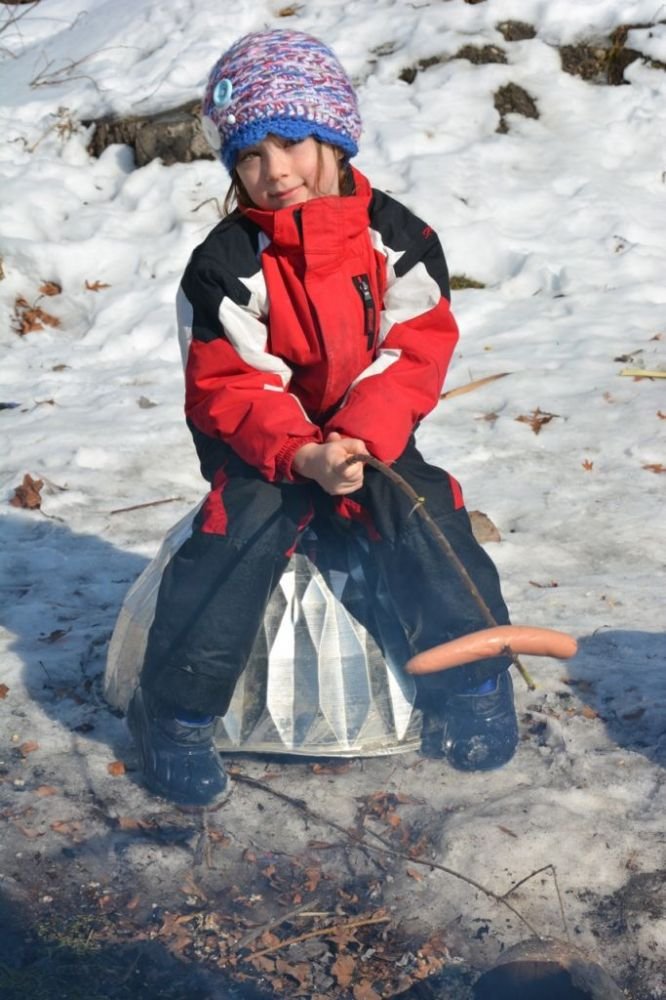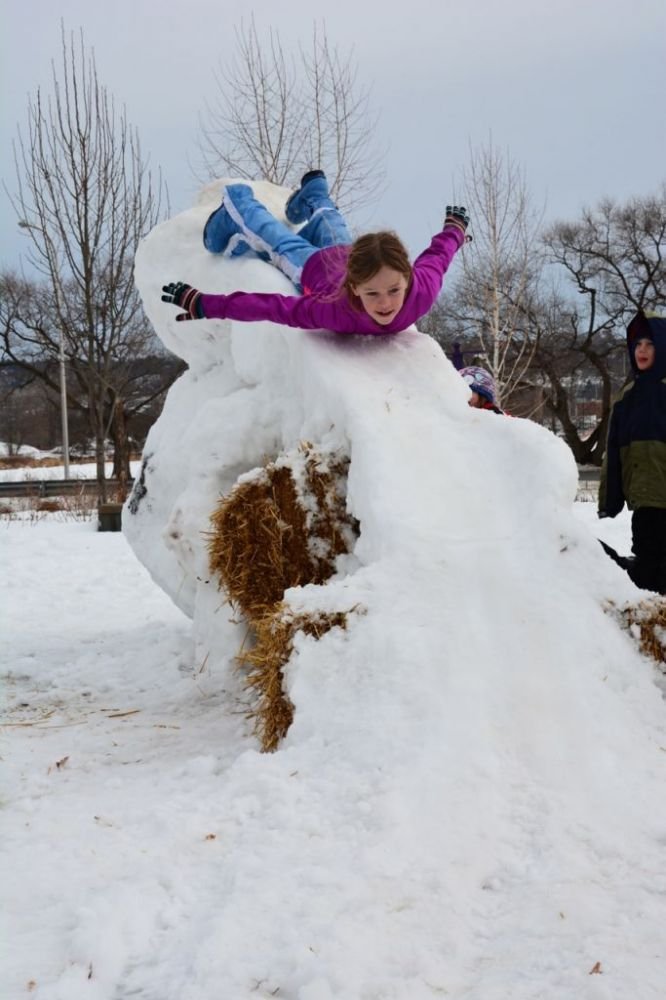So there I was, heading to the Hands-on-Nature Anarchy Zone at the Ithaca Children’s Garden. It was winter play camp week during the winter break and I was coming to hang with the kids and see what sort of fun things were happening. I arrived mid-morning and was excited to check out the scene. Much to my surprise as I pulled up: nobody was there. It was a beautiful sunny day — the perfect day for outside winter camp — but where was everybody? I could see a small drift of smoke from the where the campfire is located—but no one there? I don’t get it. I gather my stuff and get out of the car and head to the fire and picnic table, all the while trying to solve this puzzle. Nobody was in the garden anywhere. “They wouldn’t have left. No way! What the heck is going on?” I set my things down, poke the fire a little bit then stop and look up and there’s the answer: everybody—the kids and all the playworkers— were across the way sledding and having fun. Perfect! Of course! Mystery solved! Too funny. Eventually everybody makes their way back to the garden, happily pooped and ready for lunch: hotdogs roasted over the fire. Perfect timing, Keeler!
What a relaxed and happy scene. Some kids roasting the dogs, some kids taking a break, one kid in a tree, playworkers sharpening hotdog sticks and blowing on the fire. After lunch kids played games in a willow tunnel while a group of playworkers made a humongous snowball and rolled it to a central location. Much fun was had climbing on the tall snow sculpture, jumping off, and finally sliding down the snow slide we built—an idea of one of the kids. It wasn’t until I got home and started looking at pictures from the day that it dawned on me: something special is going on. A change is underway. More than a decade ago I visited a number of adventure playgrounds in Germany and took loads of pictures of what I saw. These were amazing places filled with kid-built wooden structures, farm animals, wild gardens, and loose parts. One of my favorite shockers in the slideshow would always be the one of an untended fire, smoldering away with nobody around—as if audiences would think it was crazy and totally impossible to imagine that happening in our country. And yes, back then it was a bit shocking. Conversations were just starting about how to bring plants and dirt to children’s spaces. But with this fire i realized how far we have come and that we’ve taken it to the next level. At this moment in time there are adults everywhere rethinking the “safety at all costs” attitude and finding ways to apply common sense to children’s play opportunities. Adults everywhere are finding ways to say yes to children’s play—yes to climbing trees, building fires, growing food, tending animals and kids building their own worlds with loose parts and tools.
Now, saying yes is great, but it’s not that simple of course, is it? (at least not that simple for we adults. it’s quite simple for kids: we say yes and the kids go play) There are many factors to consider and many hoops to jump through for us to feel comfortable with yes. But that’s ok. We’re ready. And together we’re making doing it. We’re making great strides and inspiring each other to support children’s play in greater and more interesting ways. At the recent US Play Coalition conference at Clemson University in South Carolina much of the talk revolved around communities working together to increase children’s play opportunities and at the same time actually looking at the benefits of risk, rather than only the management and removal of risk. How refreshing! How interesting. And how beneficial to the lives of children.
I’m inspired, amazed, and excited to watch this adventure play renaissance unfolding. But don’t get me wrong. Leaving fires unattended is not the end-all be-all goal of this movement. The goal is freedom to play. What excites me about that fire is what led up to that fire’s very existence:
- Interested adults committing to enriching the lives of children through play
- An organization willing to create host a site for adventurous play
- Thorough conversations about play and risk benefits
- Intensive playwork training and self-reflective practice
- Financial support – from both governmental and non-profit organizations
- Community support in building and visiting the space
- Trust and communication with children (and parents)
- Interest in not just summer camp but winter camp too
- Interest in having fires to cook on and support for children around the fire
- Trust in community, kids, and the site to have a fire and even be able to leave it unattended from time to time
When you see children in free play it seems so obvious, natural, normal. And it is. But to make it happen today it often takes thoughtful conversations and careful planning by adults. And while that hasn’t necessarily been the natural thought process adults in recent times—in schools, parks, neighborhoods—the times they are a-changing. And we’re finding more ways every day of saying yes to children’s play.




